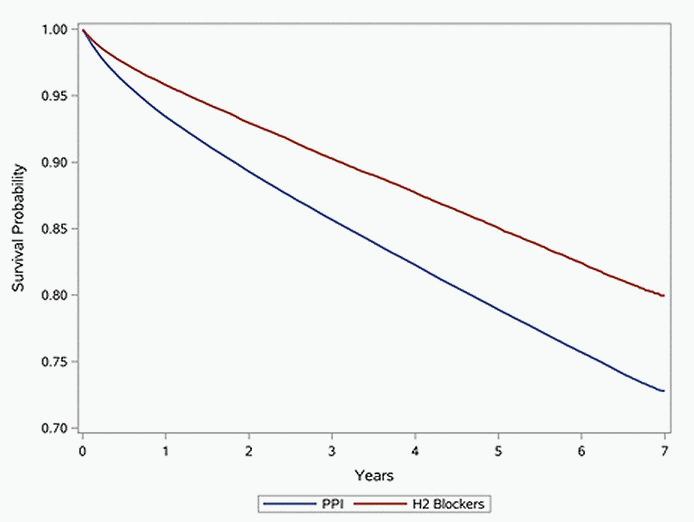Acid Blockers Are as Deadly as Cigarettes

Research shows that after 20 to 30 years of cigarette use, smokers have a 50% higher risk of dying than non-smokers. Now a major new study in the British Medical Journal shows that taking over-the-counter Proton Pump Inhibitor (PPI) acid blockers for two years results in a similar 50% higher risk of dying. It's an astonishing comparison: Prolonged use of acid blockers is potentially as deadly as 20 to 30 years of smoking!
Fortunately this is preventable. But it requires a paradigm shift in how we address heartburn and indigestion.
Background
Multiple studies show that acid blockers called PPIs are associated with a dramatic increased risk of bone thinning (osteoporosis), dementia, and a host of other problems. There's a reason why most animals have evolved to create stomach acid that can dissolve in their own stomach. It's because this acid is critical for proper digestion and nutrition. Without it, people can be malnourished — even if they're obese.
So it should come as no surprise that there's a high price to pay for blocking stomach acid for too long.
What the New Study Showed
This large study of over 349,000 people was led by Ziyad Al-Aly, MD, Director of Clinical Epidemiology at the VA St. Louis Healthcare System. They compared people who took prescription and over-the-counter acid blockers (PPIs) to those who took much safer and gentler acid blockers such as Tagamet and Zantac, as well as to those who took no acid blockers.
What they found was stunning! Although there was no significant increased risk in taking acid blockers for a month or less, which is how they are meant to be used, people who took them for one to two years had a dramatic 25-50% increased risk of dying. (See Popular Heartburn Drugs May Boost Death Risk: Study and Risk of death among users of Proton Pump Inhibitors).
Preventable Deaths
The graph below shows that 27% of those in the study who used PPIs died after seven years of use, compared to only 18% of those who used safer acid blockers, such as Tagamet. That equates to 180,000 versus 270,000 deaths per million depending on which treatment is followed. Since millions of people use acid blockers, hundreds of thousands of deaths might be preventable every seven years.

The Problem
Research has shown that acid blockers are highly addictive. After six weeks of use, people get a rebound acid hyper secretion when they try to stop taking them. This "Niagara Falls" of acid flow causes many people to dangerously choose to resume using the acid blockers and continue them long term.
The Solution
Most people's understanding of heartburn is faulty. It's not caused by too much stomach acid, as we're led to believe. In fact most people with indigestion don't have enough stomach acid. Their food isn't adequately digested, and an hour later acid reflux sets in — an unpleasant sensation arising when your stomach hits the "return to sender" button. So although reducing stomach acid through acid blockers keeps the reflux from causing heartburn, it also aggravates the problem. Which is poor digestion.
The solution is actually fairly simple. Indigestion comes not from too much stomach acid, but from poor digestion. And digestion can be improved by simply using plant-based digestive enzymes with meals, along with nutritional supplements such as DGL licorice that enhance the stomach's protective lining (for example, Advanced DGL™ from EuroPharma). After six weeks of this, you can switch from their acid blocker to Tagamet. This is effective because it doesn't completely turn off your stomach acid, so you won't get the rebound acid hyper secretion that makes PPIs addictive. After a month, you can stop the Tagamet and stay on the natural digestion support as needed.
This approach can keep you off medications and free of heartburn pain, while having healthy digestion and improved health. You can treat occasional indigestion with chewable antacids. Research has raised a concern about taking plain calcium, and it's therefore recommended that you combine calcium with magnesium and vitamin D and K to avoid calcium depositing in the arteries. This can be found in combination in products such as Immediate Heartburn Relief™.
Fortunately, with proper nutritional support it is likely that the problems caused by long-term PPI use can be reversed.

Jacob Teitelbaum, M.D. is one of the world's leading integrative medical authorities on fibromyalgia and chronic fatigue. He is the lead author of eight research studies on their effective treatments, and has published numerous health & wellness books, including the bestseller on fibromyalgia From Fatigued to Fantastic! and The Fatigue and Fibromyalgia Solution. His newest book (June 10, 2024) is You Can Heal From Long COVID. Dr. Teitelbaum is one of the most frequently quoted fibromyalgia experts in the world and appears often as a guest on news and talk shows nationwide including Good Morning America, The Dr. Oz Show, Oprah & Friends, CNN, and Fox News Health.
